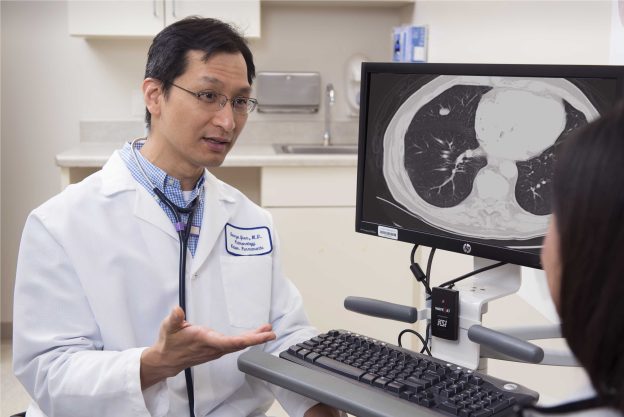
New rapid-cycle research projects seek actionable insights on COVID-19
The Kaiser Permanente Southern California Regional Research Committee and the Care Improvement Research Team recently initiated 4 new rapid-cycle research projects that will help answer questions regarding prognosis for patients with suspected or confirmed COVID-19. Specifically, these projects will seek insights on the prognosis for:
- Patients in the emergency department with symptoms suggestive of possible COVID-19
- Hospitalized patients with confirmed or suspected COVID-19
- Critically ill patients with confirmed or suspected COVID-19
- Patients with hypertension and confirmed or suspected COVID-19
“The motivation for projects and working groups coming together was really to inform clinical practice guidelines around COVID-19,” said Regional Research Committee Chair Bechien Wu, MD, MPH. “This is going to provide guidance directly to our emergency physicians, our intensivists, and our hospitalists to inform the care they provide to our patients.”
Research questions were prioritized by a large group of clinical stakeholders, who will also be part of the research teams, collaborating closely with scientists and staff from the Department of Research & Evaluation.
“Right now, there are many unanswered questions about COVID-19, including how to assess and manage risk for patients with suspected or confirmed COVID-19,” said George Yuen, MD, chief of pulmonary and critical care medicine for KPSC. “These studies will shed light on the factors and predictors associated with more severe disease and will significantly inform our clinical decision-making for patients in our emergency rooms, hospitals, and ICUs.”
Funding from the Regional Research Committee will support analyses as well as the creation of a comprehensive data resource that will be accessible by permission to physicians and scientists.
The projects are moving forward on a rapid-cycle timeline, which will include intensive efforts to disseminate the findings internally to improve care for our members. Findings from these studies will be shared in the public domain as well.
“We are addressing important and urgent research questions that inform our frontline clinical partners and also the broader scientific community,” said Michael Gould, MD, MS, scientific director of the Division of Health Services Research & Implementation Science and leader of the Care Improvement Research Team “This is really at the core of our mission as researchers embedded within Kaiser Permanente Southern California’s care delivery system.”
Funding for the Regional Research Committee rapid-cycle projects comes from Community Health and the Garfield Memorial Fund.
Project 1: Identifying ED patients with pneumonia or symptoms suspicious of COVID-19 at high-risk
During the COVID-19 pandemic, front-line emergency physicians are trying to identify people at high risk, but data are limited and SARS CoV-2 testing results are generally not available at the time most physicians must decide to hospitalize or discharge a patient. Our study aims to identify emergency department patients with pneumonia or symptoms suspicious of COVID-19 who are at high risk of death or severe respiratory failure within 7 days. Our research team will use these results to develop a risk score to help physicians determine who to safely discharge home and which patients are at elevated risk and may warrant hospitalization.
Project 2: Hospitalized patients with confirmed or suspected COVID-19
A significant proportion of patients who are hospitalized with COVID-19 are at risk for rapid deterioration and ICU admission. Researchers are partnering with clinicians to identify risk factors, including lab values and nursing flow sheets. The goal is to build a prediction tool for early identification of patients at high risk of deterioration to allow for early intervention for high-risk patients. The research team will use machine learning and predictors that capture change over time to generate a predictive risk score for ICU admission. They will then adapt the model to work as a regression to facilitate implementation into Kaiser Permanente HealthConnect®.
Project 3: Critically ill patients with confirmed or suspected COVID-19
Researchers are also working to develop a risk score that can predict clinical deterioration among critically ill patients admitted to the hospital with confirmed or suspected Covid-19. The risk score will draw on information about demographic characteristics, vital signs, comorbid conditions, imaging findings, and lab test results. The research team will evaluate existing models to identify ICU patients with Covid-19 at increased risk for prolonged ventilation or death. The team will then develop and validate a prediction tool to identify ICU patients with Covid-19 who are at increased risk for prolonged ventilation or death.
Project 4: Patients with hypertension and confirmed or suspected COVID-19
Currently, there is limited and conflicting evidence on the association between use of angiotensin converting enzyme inhibitors (ACEIs) or angiotensin receptor blockers (ARBs) and the severe acute respiratory syndrome coronavirus 2 infection that causes COVID-19. Researchers will study our Kaiser Permanente Southern California population to determine the risk of COVID-19 infection among patients with hypertension taking ACEIs or ARBs compared with patients with hypertension taking other classes of antihypertensive medications. They will also examine the risk of severe morbidity and mortality of COVID-19 among patients with hypertension taking ACEIs or ARBs and confirmed COVID-19 compared with patients with hypertension and taking other classes of antihypertensive medications and confirmed COVID-19.
Project team
The project team includes the following research scientists and Southern California Permanente Medical Group clinical partners:
R&E Scientists: Adam Sharp, MD, MS; Claudia Nau, PhD; Michael Gould, MD, MS; Kristi Reynolds, PhD, MPH; Jaejin An, PhD
Southern California Permanente Medical Group physicians:
Pulmonary/Critical Care: George Yuen, MD; Luis Moreta-Sainz, MD; Viji Sankar, MD
Hospital Medicine: Dan Huynh, MD; Christopher Subject, MD
Emergency Medicine: Ali Ghobadi, MD; Matt Silver MD; Harminder (Tony) Brar, MD; Matt Smith, MD
Cardiology: Mingsum Lee, MD
Nephrology: John Sim, MD
Internal Medicine: Jeffrey Brettler, MD, and John Martin MD
Family Medicine: Angeline Ong-Su, MD
Family Medicine/Hospitalist: Benjamin Broder, MD, PhD
Neurology/Immunology: Annette Langer-Gould, MD, PhD
Pediatrics: Patrick Van Winkle, MD





